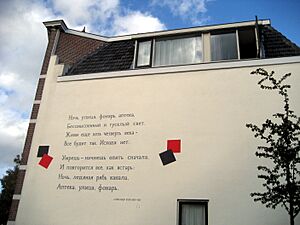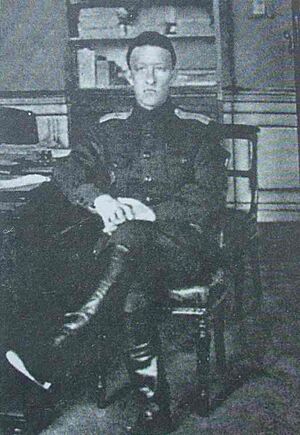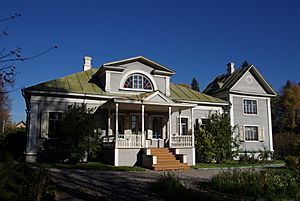Alexander Blok facts for kids
Quick facts for kids
Alexander Blok
|
|
|---|---|
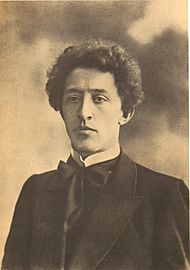
Alexander Blok in 1903
|
|
| Born | Alexander Alexandrovich Blok 28 November [O.S. 16 November] 1880 Saint Petersburg, Russian Empire |
| Died | 7 August 1921 (aged 40) Petrograd, Russian SFSR |
| Occupation |
|
| Language | Russian |
| Literary movement | Russian symbolism |
| Notable works | The Twelve |
Alexander Alexandrovich Blok (Russian: Алекса́ндр Алекса́ндрович Бло́к; 28 November [O.S. 16 November] 1880 – 7 August 1921) was a very important Russian poet. He was also a writer, publicist, playwright, translator, and literary critic. He is known as one of the main figures of Russian symbolism, a special style of art and literature.
Contents
Alexander Blok's Early Life
Alexander Blok was born in Saint Petersburg, Russia, in 1880. He came from a family of smart and educated people. His father was a law professor. His mother's father, Andrey Beketov, was a famous plant scientist. He was also the head of Saint Petersburg State University.
After his parents separated, Blok lived with his relatives. They lived at a country house called Shakhmatovo near Moscow. There, he became interested in the ideas of a philosopher named Vladimir Solovyov. He also discovered old poems by Fyodor Tyutchev and Afanasy Fet. These early interests greatly influenced his first published poems. These poems were later put together in a book called Ante Lucem.
Becoming a Famous Poet
In 1903, Alexander Blok married Lyubov Dmitrievna Mendeleeva. She was an actress and the daughter of the famous chemist Dmitri Mendeleev. Blok wrote a collection of poems for Lyubov that made him very famous. This collection was called Stikhi o Prekrasnoi Dame (Verses About the Beautiful Lady). It was published in 1904.
Blok was excited about the 1905 Russian Revolution. Later in his life, he wrote more about political ideas. He thought a lot about the future of his country. Some of his works from this time include Vozmezdie (1910–21) and Skify (1918). He felt that big changes were coming. He wrote in his diary in 1917 that he sensed a "great event" was near.
After the October Revolution in 1917, Blok accepted it as a solution to his worries about the future. In 1917, he worked as a stenographer. He helped a special group that was looking into actions of government ministers. In 1918, he also joined the Socialist Academy of Social Sciences.
His Later Years and Health
By 1921, Alexander Blok started to feel disappointed with the Russian Revolution. He had not written any new poems for three years. He told his friend Maksim Gorky that he had lost his "faith in the wisdom of humanity." He also explained to Korney Chukovsky why he could not write poetry anymore. He said, "All sounds have stopped. Can't you hear that there are no longer any sounds?"
Soon after, Blok became very sick. His doctors wanted him to go abroad for medical help. But he was not allowed to leave Russia. Maksim Gorky tried very hard to get him a visa. On May 29, 1921, Gorky wrote to a leader, saying Blok was Russia's best poet. He warned that if Blok died, they would be responsible.
Permission for Blok to leave was signed on July 23, 1921. But his health got much worse. Gorky then asked for Blok's wife to go with him. Permission for her was signed on August 1, 1921. However, Gorky was told about it only on August 6. The permission arrived on August 10, but Blok had already passed away on August 7, 1921.
A few months before he died, Blok gave a famous speech about Alexander Pushkin. He believed that remembering Pushkin could help unite different groups in Russia.
His Important Works
Blok's first book of poems used beautiful, dream-like images. This helped him become a leading poet of the Russian Symbolism movement. His early poems were very musical. Later, he tried new rhythms and beats in his poetry. He could often turn everyday things into amazing, other-worldly images. For example, in his poem Fabrika (1903).
His later poems often showed a conflict. This was between the idea of perfect beauty and the sad reality of dirty factories. This can be seen in The Puppet Show (1906).
His next collection, The City (1904–08), described Saint Petersburg. It was both vivid and a bit strange. Other collections like Faina and Mask of Snow also made him more famous. People often compared him to Alexander Pushkin. Many consider Blok to be the most important poet of the Silver Age of Russian Poetry. In the 1910s, other writers admired him greatly. He had a huge influence on younger poets. Famous poets like Anna Akhmatova and Boris Pasternak wrote poems honoring Blok.
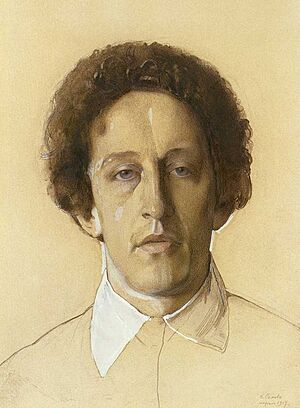
Blok shared his thoughts about the revolution in a mysterious poem called "The Twelve" (1918). This long poem has "mood-creating sounds" and "harsh, slangy language." It tells the story of twelve Bolshevik soldiers marching through the streets of Petrograd. A strong winter storm rages around them. "The Twelve" made some of his readers upset. They felt he had lost his artistic touch. The Bolsheviks, on the other hand, did not like his earlier mystical style.
Blok looked for new language and images for his Symbolism poetry. He used unusual sources like city stories, sad songs (ballads), and short, funny songs (ditties). He was inspired by a popular singer named Mikhail Savoyarov. Blok often went to Savoyarov's concerts between 1915 and 1920. One expert, Viktor Shklovsky, noted that "The Twelve" uses language and style similar to Savoyarov's songs. This showed how Blok copied the street slang of 1918 Petrograd.
Music Inspired by Blok
Many composers have set Alexander Blok's poems to music.
- Dmitri Shostakovich wrote a song cycle called Seven Romances on Poems by Alexander Blok.
- Mieczysław Weinberg created a song cycle for soprano and piano, Beyond the Border of Past Days.
- Arthur Lourié wrote a choral cantata, In the Sanctuary of Golden Dreams.
- Alexander Blok was a favorite poet of Georgy Sviridov. Works like "Petersburg" and "Nightly Clouds" use Blok's poetry.
- Yevgania Yosifovna Yakhina also set several of Blok's poems to music.
See also
 In Spanish: Aleksandr Blok para niños
In Spanish: Aleksandr Blok para niños
 | Misty Copeland |
 | Raven Wilkinson |
 | Debra Austin |
 | Aesha Ash |


